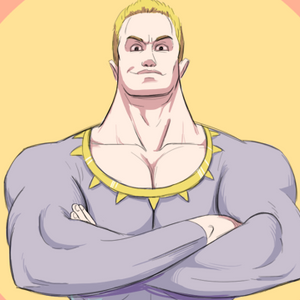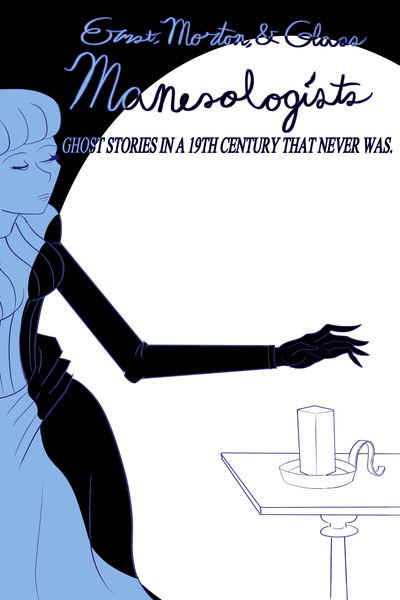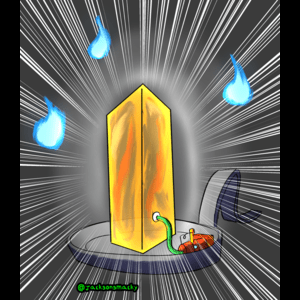In Blackwall, the city that was called the ghost of London, the three manesologists who composed Ernst, Morton, and Glass took their morning tea and coffee together in their office as they routinely did. It was part of the wheel of their lives–tea, ghosts, sleep, followed by tea, ghosts, sleep.
“Thank you, Nick.” Dr. Joseph Morton said as their employee, a young man who had died in the fireball that swallowed London, warmed his tea by placing a thin skin of green ectoplasm around the cup. The ectoplasm suffused the china cup and made it glow like an ember fresh from a fireplace.
Joseph was a man large in size and long in age. He had the largest cup at the table, and yet he could lift it with just a finger and did just that, pouring the cup’s warm contents past his bushy white beard and down his jowly throat.
“Ah, now I feel awake!” Joseph exclaimed.
Nick had died in incredible heat, and so his ghost was reborn as heat. He could not assume a human form, or anything even resembling a human form, but he could become fire and warmth, and did so, most often in the form of a green fireball or glow. He chose to be the color green because he thought it a spiritual color that would cause people to consider him a spirit first and living fireball second.
Because Ernst, Morton, and Glass did Nick a great kindness several years ago, Nick worked as their employee keeping their offices lit and heated with his power. Because of Nick’s work, Ernst, Morton, and Glass never had to worry about paying bills for heating or their early morning drinks getting cold.
Dr. Matthew Ernst took delicate sips of his tea as he made his way through his daily morning reading. Today he read a manesological paper fresh from Ireland by a manesologist named Harry Escott. The paper dealt with the phenomena of a lady in green clothes seen walking about the ruins of various medieval fortifications and castles. The contents of the paper were indecipherable for the ordinary man, loaded as they were with technical terms and the language of the prehuman Dyeus culture, but were gripping to Dr. Ernst.
Dr. Ernst was a quiet, reserved gentleman of unremarkable looks, but any manesologist would recognize his face. Years ago, he wrote an influential paper on the internal operations of a ghost’s composition. Such technical concepts were irrelevant to the lives of normal people, and so he was regarded as just another face in the crowd by most, but among manesologist, he was regarded as a pioneering scientist. They said he was to metaphysical anatomy what Vesalius was to physical anatomy.
Dr. Martin Glass did not take tea, he took coffee. He developed a taste for the drink years ago when he studied the works of Abdul Alhazred in the Bagdad as part of his thaumaturgical education. There was a time in his life when he aimed not to be a manesologist, but a thaumaturgist.
The thaumaturgists of the Ror Raas, who Major General George Colley of the British army, of the largest and strongest military on Earth, called “the uncrowned kings of the world,” were a group of men and women who achieved great knowledge and power through what they called the Abramelin Operation. This was a series of psychic meditations which, when carried to completion, allowed one to communicate with his or her own soul. These meditations were gleaned from the dreams of Abramelin, a gigantic being that slept beneath Luxor, Egypt, whom occultist Samuel Mathers made telepathic contact with in 1865.
The Ror Raas anticipated the worldwide increase in earthbound ghosts throughout the later half of the 19th century and believed that manesological activity would continue to increase into the 20th. To maintain peace between the earthbound dead and living humanity, the Ror Raas bestowed gaeite, the miracle of the Dyeus culture, upon a group of anthropologists, alienists, and occultists to form the first manesologists.
The Ror Raas, of course, had the power and knowledge necessary to mediate between ghost and man, what George Colley had said was in complete earnestness, but they feared that taking on such a responsibility would give them undue influence over the world. They were fearful of becoming a race of god–kings ever since they began intervening in armed conflicts around the world starting with the American Civil War in 1863 when they brought an end to hostilities by placing fires in the sky over the Battle of Shiloh. Thus they say it necessary to recruit men that had one foot in their world and one foot in the mundane world, men like Martin Glass.
Martin Glass wanted to be a thaumaturgist, not a manesologist. He wanted to talk to his own soul, not the souls of others. But something happened during his education that caused him to abruptly change paths. What this something was, he never told Joseph and Matthew, and he intended never to tell them as long as he could help it.
Though his tutelage under the Ror Raas ended before Martin could accomplish the Abramelin Operation, he picked up a few minor miracles from his lessons that came in handy in his new life as a manesologist. He could, for example, see and touch ghosts, no matter how immaterial they might be. Matthew and Joseph could only do the same with the aid of a gaeite candle.
Martin wore large, dark glasses which dulled the color of his piercingly blue eyes. Martin was young, relative to Matthew and certainly to Joseph, and his mustache, while as thick as Joseph’s, was a vibrant blond instead of a snowy white.
Martin sipped his coffee and gazed at the wall, or perhaps through it. He was given to go off into trances in which his mind would jerk at the chain of his body and take half-steps through the Astral universes his teachers mapped.
Matthew read, Joseph woke up, and Martin dreamed.
All three men were momentarily taken out of their morning habits by a blue face materializing through the door.
“I got today’s Blackwall Undertaking!” Esmee Walker announced. “And judging by the cover, its a really interesting issue!”
Esmee, like Nick, was a victim of the London fireball, but unlike Nick, she was able to assume a human form. She appeared in the beautiful, albeit simplified, form of a woman, like a statue of blue glass come to life. She was another employee of Ernst, Morton, and Glass and worked their electrograph, sending and receiving messages from all around the increasingly haunted Earth.
Esmee placed her copy of the Blackwall Undertaking on the table and left through the wall to check on the electrograph. She checked it night and day, for she never slept, and the electrograph had opened an entire world of nighttime activity and correspondence. Esmee considered some parts of her ghostly existence a curse, others a blessing, and she found her unending endurance to be among the blessings. She thought she was like the Earth. The Earth, like herself, never slept, not fully. While England slept, China was awake, and Chinese manesologists had wonderful stories to share with her over the electrograph about the legendary Zhong Kui, who they considered to be history’s first manesologist.
Joseph grabbed up the broadsheet and brought it close to his tired eyes. Then he groaned.
“Hmph. Hrumph!”
Esmee stuck her head back through the wall. ‘I heard that! I thought you’d have a strong reaction to that image, Dr. Morton!” She then pulled her head back through the wall and vanished, with her smile being the last part of her to go.
“”Hmph? Hrumph?” What’s that all supposed to mean?” Joseph asked.
“Hrumph rumph rumph.” Joseph bellowed.
“I’m having a hard time deciphering your ape language, old man.” Joseph said.
“What? Didn’t the magic men teach you how to talk to animals like how Elijah talked to the ravens?” Joseph always called the thaumaturgists “magic men,” because it always bothered Martin to hear the four syllable title reduced to two monosyllabic words.
“Elijah didn’t talk to the ravens, you big ape.” Martin said.
“He did too, and I’m surprised you don’t know that.” Joseph said. “The story of Elijah and the ravens is something taught in every Sunday school.”
Martin turned to Matthew. “Matthew? Please help me elucidate our simple friend here. Did Elijah talk to his ravens?”
“1st Kings doesn’t mention the ravens talking to Elijah.” Matthew answered, not bothering to look up from a captivating passage on the color green as used in medieval heraldry.
“Though it doesn’t mention them not talking, the implication seems to be that they were non-communicative ravens, completely normal and mundane save that they brought the prophet food under the command of God.”
Martin smirked. “Told you so, old man.”
“Now, now, boy. Remember what I said exactly.” Joseph said. I said that Elijah talked to the ravens. I said nothing about the ravens talking to him.”
“Oh, really?”
“Yes.
“And why would the great prophet bother to speak to animals incapable of talking back?”
“Because he’s polite, obviously. Those ravens brought him food in the morning and in the evening. They were very dutiful avians, so there’s no doubt that Elijah whispered “thank you” at least once or twice.”
“But the ravens had nothing to do with the food, not really. They acted as agents of God. Their work was God’s work, and so Elijah should have thanked God, not the birds.”
“Boy, when we’re eating at Bishop’s Restaurant on Curant Street, and the waiter brings you your sauti of rabbit, do you say “Thank you, garcon,” or do you say “Thank you, chef?””
“That is an entirely different circumstance. The waiter is not an extension of the chef’s will. The ravens were an extension of God’s will. They were like God’s puppets. They were like my dogs.”
Martin sloshed his coffee high into the air.
Matthew saw the black liquid arc through the air out of the corner of his eye. “If you spill something, clean it up.” he muttered while reading a passage speculating on a possible connection between the green ladies of various castles and a mythological figure known as the Glaistig.
The coffee stopped in mid air as if suddenly frozen into a solid jet.
“Not a chance of that.” Martin said. “Remember when my dogs caught the bullets of those assassins? Some coffee is nothing to them.”
Martin’s two dogs were carryovers from his thaumaturgical education. They were thought-forms, mental energies shaped by his willpower, and were useful for many things, horseplay included
The dogs compressed the coffee back into a cup shape and slotted it down into Martin’s cup.
“Joseph, when my dogs save your life by blocking a bullet, or a knife, or a stone, do you say “Thank you, doggies?” No, of course you don’t! You say “Thank you, Martin,” though that’s assuming you even remember to say “thank you,” you rude gorilla! The point is, my dogs are extensions of my will, just as Elijah’s ravens were extensions of God’s will. Thanking the ravens would have been like thanking the hand of a person that pulled you out of danger instead of the person. You might do something like that, strange as you are, but the average person wouldn’t.”
“We never fail to find the most creative things to argue about over breakfast, don’t we?” Matthew said.
“Boy, you are assuming out-of-hand that the ravens were actually ravens.” Joseph said.
“Oh, this is an interesting pivot.” Martin said.
Would the almighty really mind-puppet a flock of corvus corax when he already has an entire celestial host of winged messengers?” Joseph asked. “ That would be like you going to the pound and picking out a flesh-and-blood dog to train to pick up rocks and block bullets. I think the implication in the scripture is clear: God sent his angels to Elijah in the form of ravens.”
“What sort of supreme being sends his angels to deliver food?” Martin asked.
“Well, what else would they be doing? Singing hymns and pondering the divine?”
“Traditionally, it was thought they did exactly that when not called into service.” Martin said. “But psychic exploration of the Astral has revealed that angels busy themselves with much more than worship and study of the Monad. When not called to action, angels attend to matters of cosmic importance, typically involving the manifestation and regulation of universes.”
“Sounds to me like God sent his best angels to be Elijah’s ravens, then.”
“How do you figure that? One would think that food delivery would be a considerable step down in prestige from spinning galaxies.”
“One would think that, because one is human, and to humans spinning galaxies around your finger is a dream and taking food to old Elijah east of the Jordan is a chore. But I think God’s angels would have enjoyed taking a break from cosmic business. I think they would have enjoyed stretching their wings in air rather than aether. I think they would have relished using wings that actually had to be moved like wings in order to work. Imagine how exhilarating it would be to use muscles after being nothing but light?”
Joseph spread his massive arms out and puffed up his chest. “To pull with their wings and chest against the current of the air?”
Martin chuckled. “Stop that, you old ape! You look ridiculous!”
Joseph held out his wrinkled hand. “Imagine what it would be like to learn frailty and comfort, to rest in the warm, wrinkled hand of Elijah and feel him pet your hollow bones?”
Martin touched his glasses. What was behind them wasn’t an angel, but it was like one.
Martin was more like the beings of the Astral than he let on to his friends.
“You might be right, old man.” Martin said. “You might actually be right.”
“What do you mean “might actually?”” Joseph thumped his chest. “I’m always right!”
Martin smirked. “Mad apes believe the strangest things.”
Martin sipped his coffee. It was chalky and hot, just the way he liked it.
He never spun a galaxy around his finger, but the things he did while training to be a thaumaturgist were comparable. It was a completely different life compared to the one he now led. The things he saw during his training, the beings he spoke to, the places he went…and none of it, absolutely none of it, was like Earth. There was no Blackwall, or Bishop’s Restaurant, or Ernst, Morton, and Glass in Heaven.
Martin would know.
“You alright, boy?” Joseph remarked on his expression, which had suddenly turned pensive. “Something wrong with your coffee?”
“Nothing’s wrong. Anyway, let’s see what’s got you so aggravated this morning.” Martin reached over the table for the broadsheet. “Come on! Show us!”
Joseph pulled the paper out of Martin’s reach. “No! I don’t think I will!
“Children, please.” Matthew said. “I don’t want to have to buy another table.”
“Got it!” Martin exclaimed as the paper pulled itself loose out of Joseph’s hands.
‘No fair!” Joseph said. “You cheated! You used your dogs!”











Comments (0)
See all